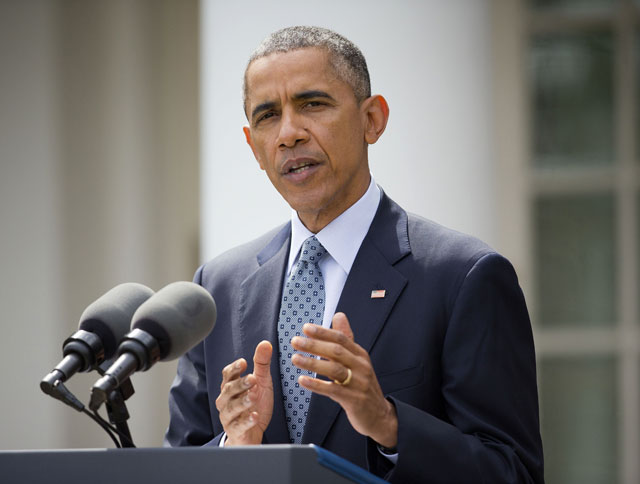WASHINGTON — US President Barack Obama has rejected a call by Israel for any nuclear agreement with Iran to be conditional on Tehran's recognition of Israel’s right to exist, branding it a "fundamental misjudgement".
Speaking after Israel proposed its own terms for the accord, Obama told US radio network NPR Monday that demands for Iran to recognise the country go beyond the scope of the agreement.
"The notion that we would condition Iran not getting nuclear weapons in a verifiable deal on Iran recognising Israel, is really akin to saying that we won't sign a deal unless the nature of the Iranian regime completely transforms," he said in a drive to sell the deal to a hostile Congress.
"And that is, I think, a fundamental misjudgement."
Israel's government reacted angrily to the historic framework agreement on Iran's nuclear programme announced last week, with a final accord due by June 30.
Prime Minister Benjamin Netanyahu demanded Sunday that Iranian recognition of Israel’s right to exist be written into the agreement.
Intelligence minister Yuval Steinitz told journalists Monday that while an earlier pledge by Obama to back Israel's security was appreciated, it did not outweigh the potential threat of a nuclear-armed Iran.
"If Iran will produce nuclear weapons, this is an existential threat to Israel," Steinitz said.
"Nobody can tell us that backing and assistance are enough to completely resist or to neutralise such a threat."
Steinitz proposed that the emerging deal between Iran and world powers should incorporate a total halt to research and development on a new generation of centrifuges, a cut in the number of existing centrifuges and closure of the Fordo facility for enrichment of uranium.
He also proposed that Tehran detail its past nuclear arms research and allow international inspectors to make spot checks "anywhere, anytime".
If such terms were accepted, Steinitz said, "it will not be a good agreement but it will be a more reasonable agreement".
Under the outline deal, the United States and the European Union are to lift all nuclear-related sanctions on Iran in exchange for a 98 per cent cut in Iran's stocks of highly enriched uranium for 15 years, while its unfinished Arak reactor will not produce weapons-grade plutonium.
The deal will also see Iran reduce by roughly two-thirds — to 6,104 from around 19,000 — the number of uranium centrifuges which can make fuel for nuclear power but also the core of a nuclear bomb.
Steinitz said that since Thursday's announcement officials have studied the proposals carefully.
"A comprehensive analysis of the Lausanne framework reveals the extent of the irresponsible concessions given to Iran and makes clear how dangerous the framework is for Israel, the region and the entire world," he said.
"We are going to do an additional effort to convince the US administration, to convince Congress, to convince Britain and France and Russia not to sign this bad deal, or at least to dramatically change it and fix it."
Steinitz said Israel preferred a diplomatic solution to the issue but it reserved the right to take military action against Iran if necessary.
"It's still on the table, it's going to remain on the table," he said.
"It's our right and duty to decide how to defend ourselves, especially if our national security and even very existence are under threat."
Meanwhile Saudi Arabia, which has long vied with Shiite Iran for influence in the Gulf and the greater Middle East, said Monday it hoped any future deal could bolster peace in the region and end interference in Arab affairs.
A statement after a weekly Cabinet meeting chaired by King Salman said Saudi Arabia "hopes the agreement will reinforce security and stability in the region and the world".
But it insisted security hinged on "the respect of the principle of good neighbourly relations and non-interference in Arab affairs", said the Saudi Press Agency.
Arab states accuse Iran of fuelling a series of proxy battles in the Middle East that have destabilised Syria, Iraq, Yemen, Lebanon and other states.
Obama has invited leaders of the several Gulf states to Camp David in the near future in a bid to assuage their concerns.
